
Mortgage Banker vs. Mortgage Broker: Why Independence is Better
With mortgages shifting from refinancing to purchase, independent mortgage brokers are in a better position to take more business away from retail.
In addition to their flexibility and independence, mortgage brokers have the opportunity to work with borrowers seeking unconventional loans, offer competitive prices against retail, collaborate with a variety of lenders and account executives, produce lower overhead, provide advisory services, and help their local communities reach the American Dream. Further, independent mortgage brokers and their loan officers and support staff have access to networking and industry-leading events.
Growth in the Wholesale Mortgage Market
The wholesale mortgage channel continues to grow every day as retail loan officers, loan officer assistants, processors, and other professionals choose to become independent brokers or join a wholesale brokerage. According to a survey released by Inside Mortgage Finance, wholesale brokers and correspondents accounted for a greater share of mortgage lender production, notably in the robust jumbo market.
Increasing numbers of homebuyers now choose to work with independent mortgage brokers, leading to shattered records in wholesale lending. The wholesale industry grew about 10% during the COVID pandemic in 2020, which was the highest since before the 2008 housing crash.
United Wholesale Mortgage (UWM) reported a higher volume of business in 2021 versus 2020. According to the company, retail lenders will see considerable margin compression in 2022; this could further entice brokers, loan officers, and other professionals away from the retail channel and into the broker space.
Brokers are poised to take even more business from retail as the industry transitions from a refinance-heavy 2021 back to a purchase-driven market.
New Paths Following Retail Mortgage Layoffs
2021 saw a number of layoffs in the retail mortgage sector, including the firing of over 75 workers at Interfirst Mortgage and Better.com’s reduction of 900 workers. Mortgage production fell by 27% at Wells Fargo in 2021, as fewer loans were made to homebuyers; following, 270 branches were closed, and 16,000 workers were cut.
Just two months into 2022, Interactive Mortgage shed over 50 employees. With refinancing decreasing and rates rising, companies are placing pressure on margin compressions. Many more retail mortgage layoffs are predicted this year, resulting in a unique opportunity for those mortgage professionals to join wholesale mortgage.
Mortgage Brokers Have Lower Overhead
In times of margin compression, large banks typically reduce compensation. In spite of this, independent mortgage brokers can set their compensation at desirable levels and pay their employees more since wholesale costs are lower; they do not need to hire underwriters, closers, or marketing staff.
Nevertheless, the wholesale mortgage industry is not immune to layoffs; Stearns Wholesale laid off almost 350 people in January 2022. Lender margins will continue to shrink due to increased competition.
The wholesale mortgage channel can continue its growth by bringing in individuals completely new to the industry as well as drawing talented loan originators and other mortgage professionals away from retail operations through:
- Providing education both organically and through online advertising campaigns can bring further awareness to the benefits of the wholesale industry;
- Creating a recruitment email that emphasizes pricing and possible compensation breakdown in wholesale and introduces a variety of loan products and lenders found in the wholesale channel.
The broker community will only benefit from a larger and more diverse talent pool that can compete with the retail powerhouses.
3 Tips to Transition from Banker to Broker
Making the move from the retail to the wholesale channel can be an incredibly daunting decision for individuals looking to start a new direction for their careers. Leaving the corporate banking structure can be frightening for mortgage professionals who often fear that the transition will be too difficult to complete successfully.
We touched on the pros of becoming a mortgage broker, so what are the cons?
- You may work longer hours than at the bank. Many mortgage brokers answer their phone or meet with clients after normal business hours, which is an advantage to borrowers, but may be a disadvantage to those that want their evenings and weekends free.
- You may not see a lot of commission the first year.
- You will have to learn more compliance and legislative requirements.
- You won’t have an in-house underwriting team.
- As a mortgage broker, you won’t be able to offer other financial services and discounts banks can.
- Your footprint isn’t as large and recognized as a popular bank.
“Transitioning from retail to wholesale is probably the best thing I could’ve done,” says top producer Rami Daood, President and CEO of RightWay Lending. Rami was formally in Quicken Loans’ Triple Crown President’s Club. “The only thing that I regret is not doing it sooner. I transitioned in the best interest of my clients and myself at the end of the day, it was truly a win-win. Everyone loves to save money, and everyone loves to be compensated more for their best practices.”
“My recommendation for newcomers would be to face fear. It’s okay to have to get comfortable with being uncomfortable, it’s the only way you’ll ever grow. It’s all the little things you’ve ever done your whole life that’s gotten you to where you’re at now and making the jump to wholesale is the best thing for yourself and your clients.”
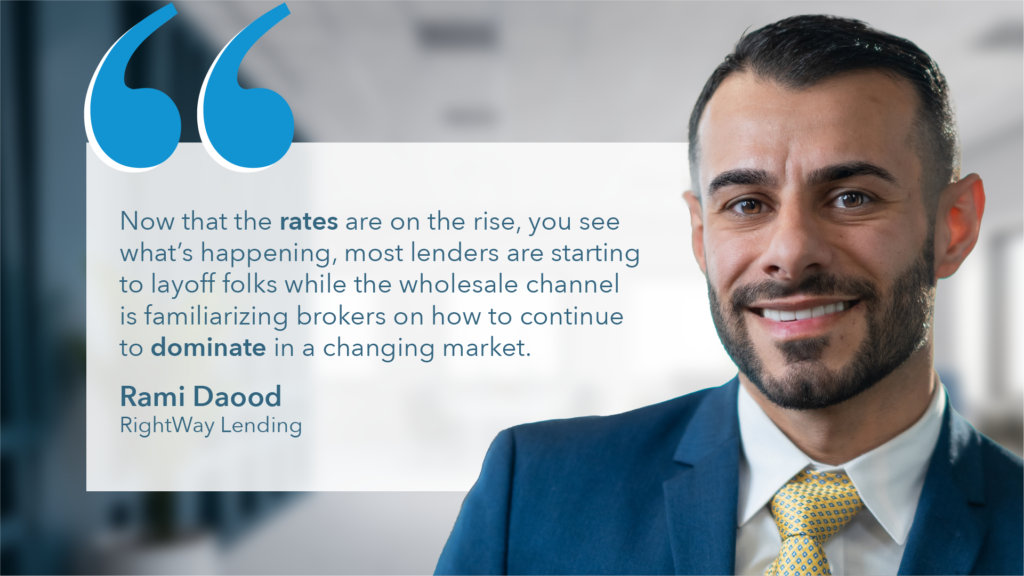
“Now that the rates are on the rise, you see what’s happening, most lenders are starting to layoff folks while the wholesale channel is familiarizing brokers on how to continue to dominate in a changing market.”
1. Leverage the Broker Community
Dovetail Mortgage owner Flavia da Silva first entered the retail mortgage business in 2013 and quickly became frustrated with the company’s inability to meet closing dates, which can be a deal-breaker for borrowers who are seeking to purchase a home.
In 2016, she left the industry and did not return until 2021. She was encouraged to join the wholesale channel by her former colleagues, who had already made that switch. She was told about AIME’s Spark program, which assists veterans, their spouses, minorities, and women to open their own brokerage in the wholesale channel.
As a Broker/Owner, Flavia realized she could control many of the issues she encountered in the retail mortgage industry. She completed the program and opened her brokerage in 2021, receiving her first clear to close soon after.
“I just wasn’t happy with the lending side. I wasn’t happy with the banks that I was working with in terms of their customer service and their underwriting was very delayed. A delay in closing, especially in Massachusetts, means there’s a possibility borrowers are losing their deposits on purchases,” says Flavia.
“For me adapting to the wholesale world was like getting invited to a party as a VIP. I was floored by the amount of support that I received not only from AIME, but from fellow brokers and wholesale lenders. Everyone seemed to go out of their way to mentor, help, and support.”
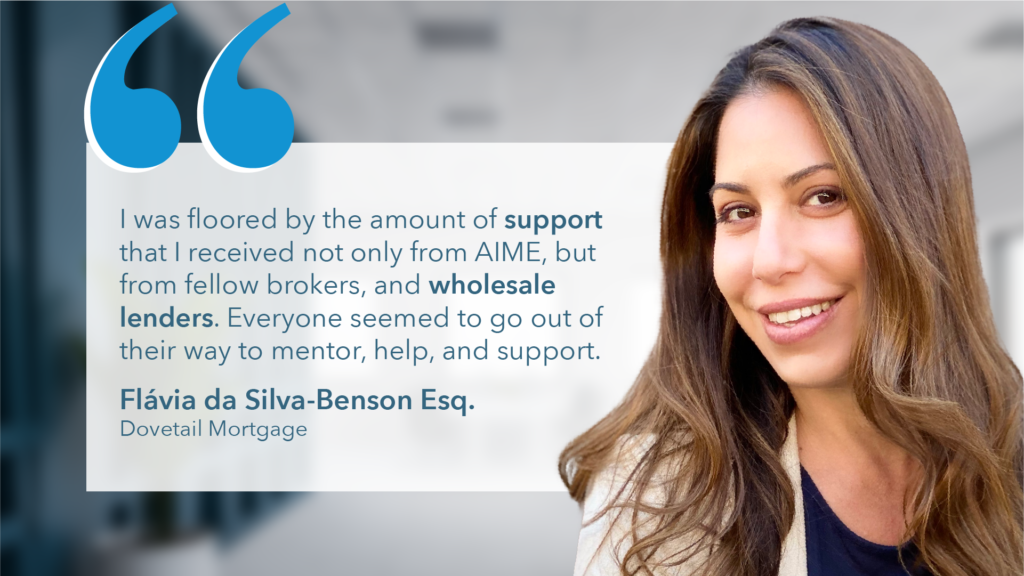
“My number one recommendation is to accept the help from those around you. It takes a while to get your state license and that time is priceless. It allows you to talk to people, learn about operating best practices, and the ‘what not to do’.”
“Most importantly, it gave me the opportunity to build relationships with other brokers in various parts of the country. The Women’s Mortgage Network was one of my favorite ‘go-to’s as I applied for my broker license and now as I venture into some unknown loan territories.”
2. Join AIME’s Mortgage Broker Mentor Program
Members of AIME hail from across the country and have experience across industries, regions, and loan types. AIME members can assist you if you are new to the wholesale channel, the mortgage industry, or AIME through the AIME Mentorship program.
Modern Home Lending’s Evan Einhorn and his team believe that if you can seek a mentor to guide you on how to start your career in the broker channel, it will help you tremendously.
“Having someone to mentor me was one of the keys to successfully launching my career in this space, and I have strived to do the same for my employees. AIME has allowed me to interact with a whole new world of mentorship that I had not previously experienced.”
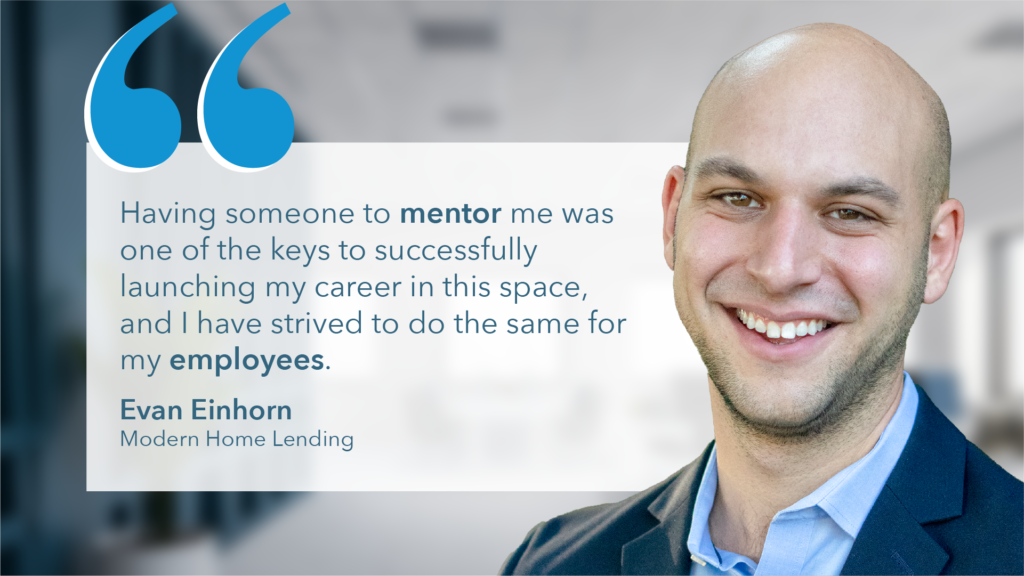
3. Learning the Differences
A new independent mortgage broker will encounter a number of differences between retail and wholesale.
Retail brokers work directly with the in-house lender, who works with prospective buyers to close the deal. Retail lenders also only offer products and rates from their own institutions. In order to obtain a mortgage, the homebuyer must submit an application with the lender, which is generally a bank or credit union. The buyer begins repaying the loan once the lender approves it.
In the wholesale channel, lenders provide mortgage loans through third-party customers, such as independent mortgage brokers. It is the job of the independent mortgage broker to compare mortgage terms and rates on behalf of their clients – the homebuyers. Once approved, wholesale lenders are then responsible for underwriting and funding the loan.
Access to Niche Loan Products
Most mortgage brokers are familiar with niche loan products, such as jumbo, Non-QM, USDA, and VA loans, and can assist borrowers with bruised credit. Mortgage brokers are simply better able to provide borrowers with more options, including more options for low down payments, limited credit histories, lowering closing costs, and, if possible, avoiding mortgage insurance. Independent mortgage brokers can also connect a more personalized experience for borrowers because they are embedded in their local communities.
“As a mortgage broker at Epoch Lending, I’m not captive to what only one company or lender can offer,” says Chad Cattani, Epoch Lending. “I have options to suit all of my clients’ needs – if the program exists, I can get access to it. This allows me, and every other broker, to help more people achieve homeownership.”
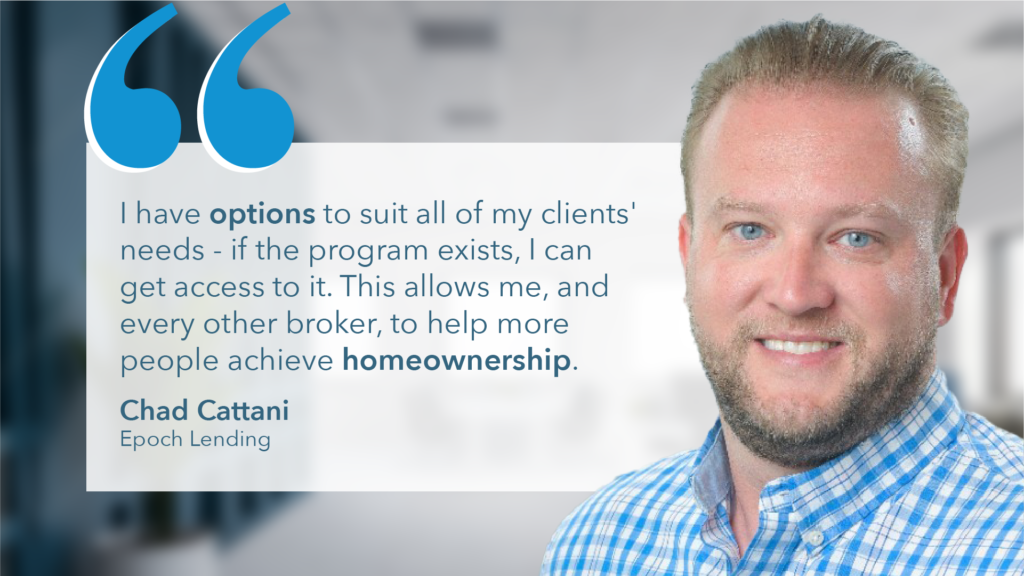
Ability to Competitively Price Against Retail
Mortgage Nerds owner Mike Cox has been a mortgage broker for over two decades and has worked for a VA-focused retail operation. As time passed, he began to notice inefficiencies both on the pricing and process side. He frequently saw brokers quoting prices that he believed were unattainable.
“Pricing would come up that brokers were offering Veterans and I thought, ‘there’s no way that’s real, there’s no compensation in there.’ I just kept making excuses,” Mike says.
After doing some research, Mike saw a disparity between the loan options he could offer Veterans and those independent mortgage brokers provided. Due to this gap, and a lack of transparency on the retail side, he decided to go wholesale.
At his retail job, Mike had a goal to close $10 million loans in a month. In the past, his retail branch came close but never achieved that target; today, as a wholesale broker, he consistently achieves it.
“When we settled into production it didn’t take us long to notice the differences. The first thing we noticed is the massive difference in not only rates but costs. Mortgage brokers are regulated differently when it comes to compensation.”
“Our rates were significantly better than in retail, especially government loans and even more specifically, VA loans. Our retail competition is sometimes a full point or higher in rate than we are. This data shows mortgage brokers are a better solution for the consumer, especially our Veterans.”
“The next thing we noticed is the process. I always heard negative things about the broker world. I believed the things I was told. I truly had no idea. I didn’t know what I didn’t know,” Mike explains.
Independent Mortgage Brokers are Advisors
In addition to providing information about rates, mortgage brokers also act as advisors to their clients. Prospective homebuyers may have a basic understanding of obtaining a mortgage and PITI, however, they may not understand the best loan products, affordability, down payments, or amortization. Educating clients about money management, credit health, and numeracy skills can help them gain confidence in buying a home in the future.
Matt Gougé (Matt the Mortgage Guy, powered by UMortgage) runs his business this way. “I continue to lead my business from an education approach geared towards empowering consumers in their home buying journey.”
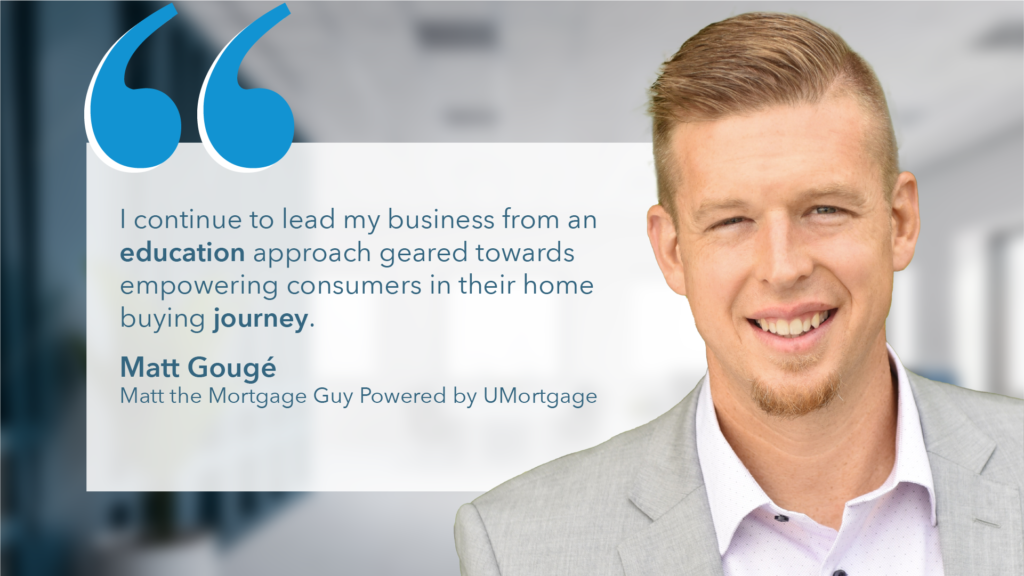
A Variety of Lenders and Account Executives
As a Broker/Owner, Mike Cox has full control. “We gave full access to talk to underwriters. We have one day to one hour turn times. We have closing docs to the title company a week before closing in a lot of cases. This was a new and refreshing experience. We had absolute control of the process. Over time, we eliminated lenders where their process didn’t mesh well with ours. This was a game-changer. We are now closing double volume than in retail with way less pain points.”
“The other thing I really like is all the options in this space. You are not held back by what someone else thinks is a good lender or product you should have access to. It’s up to you! I love to be in control of our own destiny and provide the best products and services to our clients.”
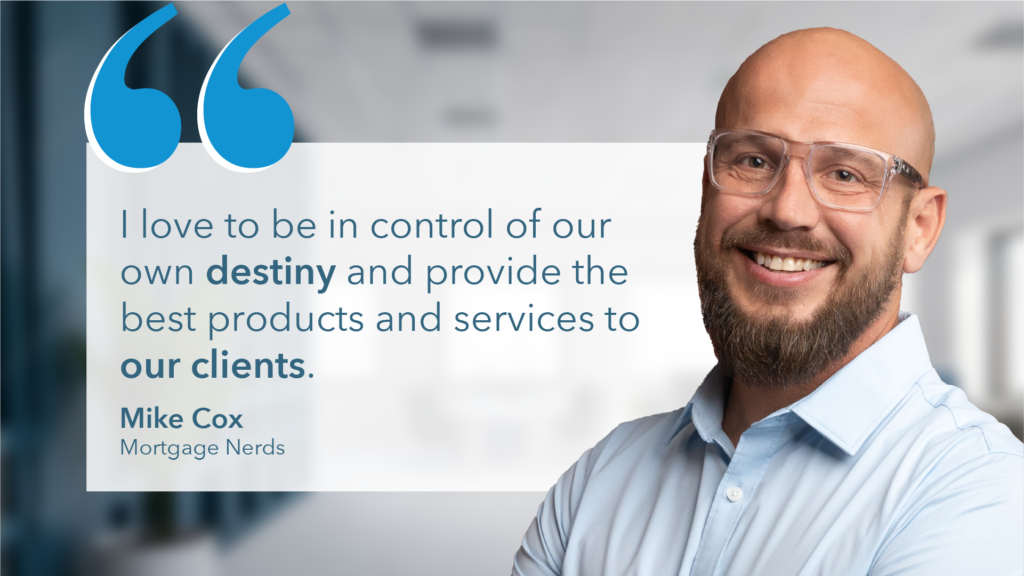
There is also room for Loan Officers and other mortgage professionals on the wholesale side. “Working for a great broker shop that shares your philosophy on business and provides all the support you need is a great option as well,” says Mike.
For JP Hussey, founder and Broker/Owner of The Hussey Team, the move from retail to wholesale mortgage resulted from a lack of control. During his year at Wells Fargo, JP saw a lot of his retail team members moving away from big banks since they too often missed closing times.
JP discovered that a large bank did not give him the flexibility he needed, so he shifted to a smaller correspondent lender. However, there was a lot of red tape and middle management that restricted JP’s abilities to help the borrower.
JP’s “aha moments” came when a local brokerage outpriced him. After losing that loan, JP realized he could be more competitive and have more control over the entire loan process if he became a broker.
“I said, hey, listen, it’s already a tough business,” says JP. “This is my shot to really take our brand to another level and really own it and go all-in with it. So, I decided to open my brokerage and, we now have so much more control.”
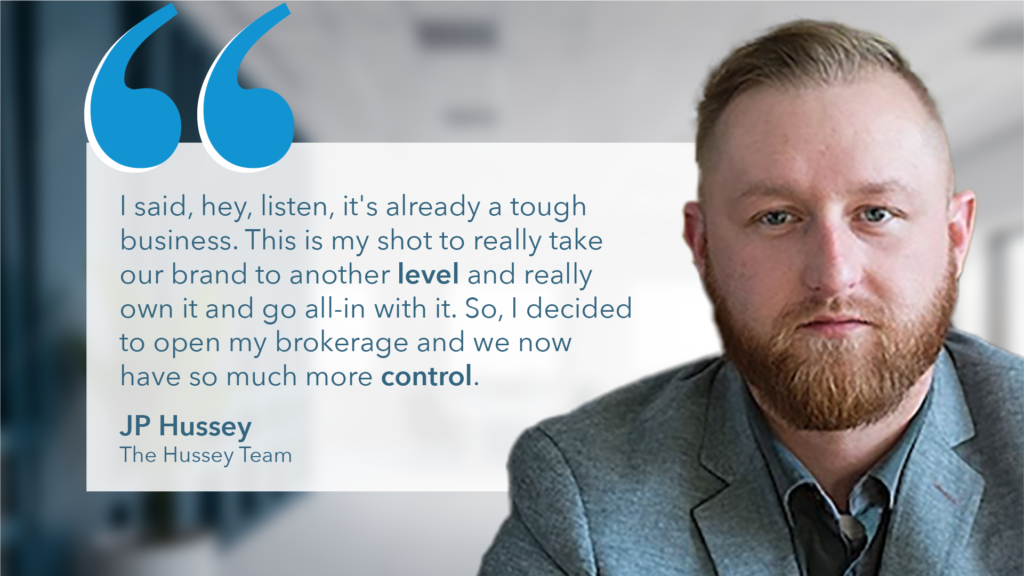
Since JP has a variety of lenders at his disposal, he can shop around for the best prices for his clients since he has full control over their loans. Moreover, he enjoys the job because he often works with neighbors and friends of neighbors.
Choosing the Right Wholesale Lenders
Selecting the right lenders is also important for a new wholesale broker. “You have to hone in really closely with the lenders you will consistently work with,” says Wade Betz, Axen Mortgage. “NEXA has over 150 lenders – and I have an answer for everything. I love being able to say yes, if yes can be said.”
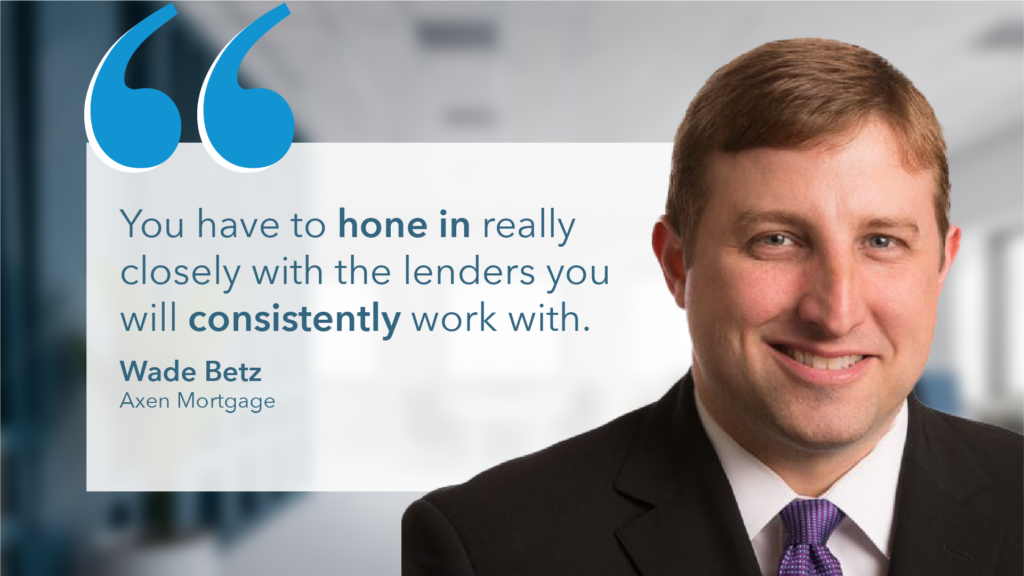
Developing Relationships with Your Account Executives
It is imperative that brokers establish a healthy relationship with their Account Executives (AE) since they are the conduit between the broker and the lender. Taking the following steps when setting up with an AE will establish a foundation for a healthy and productive partnership.
- Communicate openly. Frequent exchange of information, as well as honest feedback, is essential. Hold a weekly meeting where goals are reviewed, as well as updates on leads.
- Set the right benchmarks; target KPIs should be fully disclosed.
- Utilize a CRM to keep track of appointments and conversations.
The AIME Member Portal allows mortgage brokers to get connected with the wholesale lender of their choice and change AEs with participating lender partners.
Key Takeaways
Brokers need to keep their efforts on growing and strengthening the wholesale mortgage channel by recruiting more individuals from the retail side and expanding their current teams with support roles.
Mortgage brokers provide individuals with a level of flexibility, independence, and community-focused perspective that cannot be found in retail. In comparison to retailers, brokers are members of their communities, so they can offer better service to their friends, family, and neighbors.
If you are not already a member of AIME’s Broker Are Better and Women’s Mortgage Network Facebook groups, please join so you can be part of the mission to grow the wholesale channel.
The benefits of the wholesale mortgage community include:
- Taking part in the market’s recent growth
- Independence
- Lower overhead
- Opportunities to network and learn from other mortgage brokers
- Added flexibility and niche products in loan options
- Ability to competitively price against retail
- Capacity to be an advisor for prospective homebuyers
- The potential to work with a variety of lenders and AEs
- Community-focused work
Taking The Next Step to Become a Mortgage Broker
Brokers who wish to join the wholesale channel need to be licensed through the NMLS and meet each individual state’s requirements. You can read AIME’s guide on how to get an entry-level mortgage job to learn more.
The AIME Member Portal (AMP) offers a variety of resources to both new and existing brokers, loan officers, and other mortgage professionals, including a direct connection to top wholesale lenders, the option of escalating high-level loan issues, training resources, health care coverage, exclusive content, and more.
Ready to take the next step to become a mortgage broker or go into the wholesale industry? Learn more about the benefits of going independent, or speak to an AIME team member at info@aimegroup.com.

